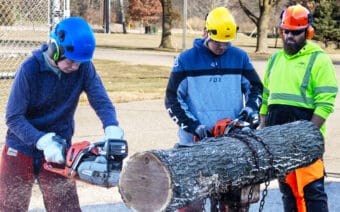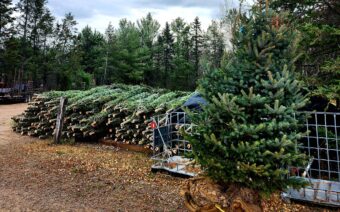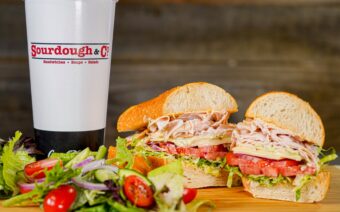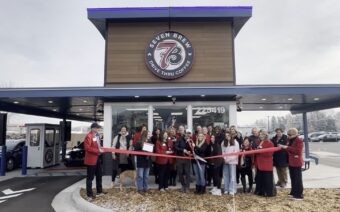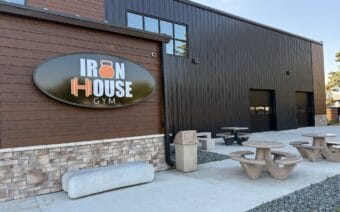
October 13, 2025
MILLADORE – Blending his passion for agriculture with a background in education, Joel Kuehnhold said he has been able to grow Lonely Oak Farm – located near Milladore in North Central Wisconsin – into both a thriving farm business and a platform for agricultural learning.
Located about 20 miles northeast of Stevens Point, Kuehnhold said Lonely Oak embraces the Community Supported Agriculture (CSA) model, which connects people with their local, family-built farms – giving them access to fresh, homegrown goods.
“Our goods are also available at area farmers’ markets and via our Sunday Brunch on the Farm, which has developed a faithful following,” he said. “We plan to grow it in the coming year.”
Kuehnhold said his love of agriculture took root early, growing up on a hobby farm where his parents tended a few acres – instilling in him the values of hard work and stewardship of the land.
A young start
When he was a kid, Kuehnhold said his family raised meat chickens and lambs he would show at the fair.
“I ended up – as with all farm families – [being] free labor for whoever needed it,” he laughed. “I helped my grandparents and uncle on their respective farms, milking cows and baling hay, as well as a neighbor with their apple orchard. I also helped a great-uncle who owned a cranberry marsh.”
Those early years, Kuehnhold said, exposed him to a wide range of farm work and gave him a diverse understanding of the agricultural world.
“The agricultural landscape in Central Wisconsin is so diverse that it was easy to have that,” he said. “Farming is something I always wanted to do. I did an awful lot of ‘carpet farming’ as a kid with my farm set in the living room.”
Kuehnhold said he was also active in 4-H throughout his childhood and attended the University of Wisconsin-River Falls intending to become a 4-H extension agent.
“When we were doing our practicum time, I really enjoyed being in the classroom with the kids as an agricultural education teacher,” he said, “so that’s the path I chose with the idea I was going to also farm somehow.”
Teaching at Stevens Point Area Senior High (SPASH) in the early 2000s after graduating, Kuehnhold said he eventually rented a small farm.
“I [also] taught agriculture at the high school in Wisconsin Rapids for several years,” he said. “I came to realize I wanted to do more farming. The farm up the road where I had worked as a kid came up for sale, and I decided to buy it. The man I bought it from was in his 90s, and his parents were friends with my great-grandparents – my mom had babysat their kids.”
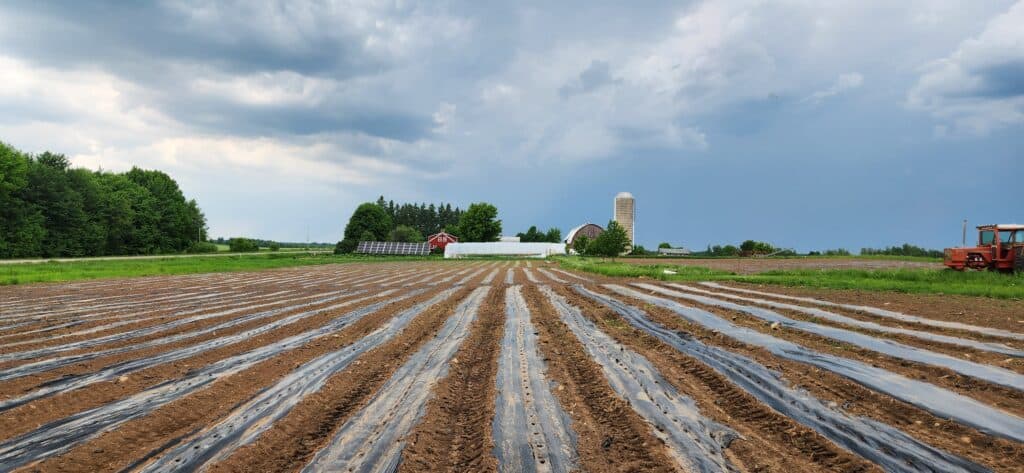
Kuehnhold said he wanted to carry on the deep family connection with the farm.
“They still come and have their family reunion here in the summer,” he said. “Their son will come out and help, so they’re still involved in the family homestead, which is really important to me – to help the land carry through the generations.”
Community Supported Agriculture
Kuehnhold said he first encountered the idea of Community Supported Agriculture while working at Family Natural Foods in Wisconsin Rapids during high school in the late 1990s.
“I was already thinking about farming and what it was going to look like,” he said. “A farmer came in from Sunny Sky Farm – the first in Central Wisconsin to do CSA – and talked to us about it. That planted a seed I never really forgot about.”
At its core, Kuehnhold said CSAs are about creating a partnership between farmers and the people they feed.
“Recent data regarding the current number of CSAs in Wisconsin is small, but news reports in recent years have spotlighted how CSA growth is the one bright spot for the state’s smaller, family farm industry,” he said. “While hundreds of dairy farms shutter each year, fresh vegetable and fruit farms, such as Lonely Oak, are flourishing.”
With customers prepaying in the winter, Kuehnhold said it gives Lonely Oak the working capital it needs before the selling season.
“The return on their investment is 18-20 weeks of fresh vegetables,” he said. “Every week, they get a box of seasonal produce we grow here on the farm.”
Unlike traditional farms that sell into the larger commodity markets, Kuehnhold said CSAs set the price needed to remain viable.
A sample box from Lonely Oak, he said, may include items such as tomatillos, zucchini, potatoes, cucumbers, cherry tomatoes, paste tomatoes, eggplant, carrots, celery, garlic, peppers, basil, parsley and watermelon.
“The farm grows up to 80 different produce varieties,” he said. “That sounds like a lot, but when it comes to tomatoes, for example, we’re growing eight different kinds of tomatoes and three different kinds of beets, and so on. It’s a regular grocery store of whatever we can grow in our climate. I also raise sheep, beef cattle and hogs.”
Starting with 40 “shareholders” a decade ago, Kuehnhold said Lonely Oak Farm’s CSA grew to a peak membership of 120.
“Now, we serve 65 households, which we’ve found is the right size for us,” he said. “The CSA concept is growing for a variety of reasons, including a demand for fresh produce from growers people know and trust.”
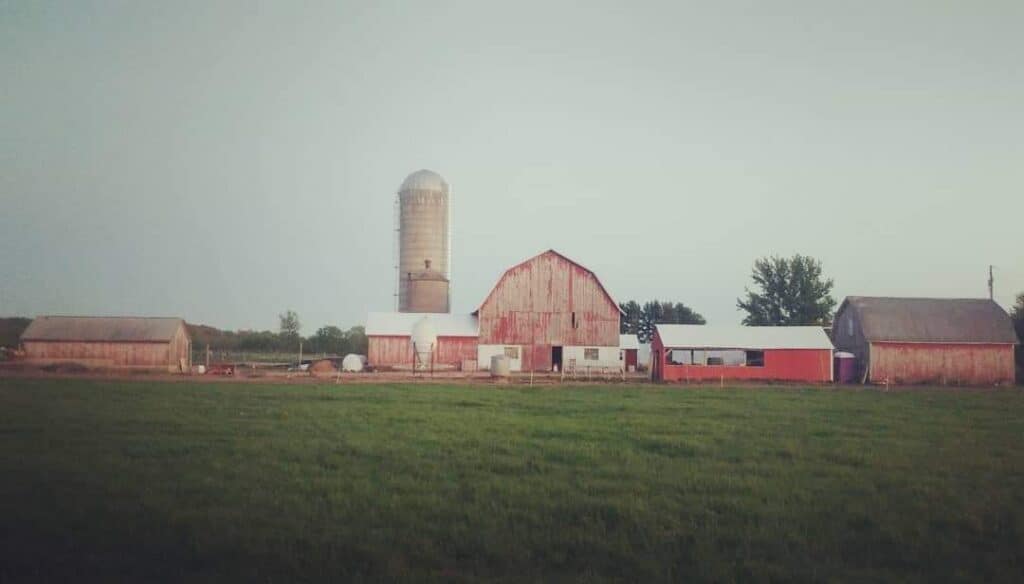
Kuehnhold said the local food movement has become “quite successful in Wisconsin.”
“It’s a very large economic driver in many regions – Southwest Wisconsin, Central Wisconsin and up north in the Bayfield and Superior shore areas,” he said. “I think part of it traces back to how the dairy industry was not affected as much by vertical integration until recently.”
Kuehnhold said Wisconsin is lucky it still has a good number of small- to mid-sized dairy farms.
“For a lot of people, when the dairy industry declined, they needed to look to alternative revenue streams for their farms,” he said. “CSA was a model they could transition to. It’s also a more affordable entry point for people who want to start farming.”
The movement is bolstered by organizations like the Wisconsin Food Hub Cooperative, which Kuehnhold said collects produce and other products from small- to mid-sized farms
“They help farmers get their food into institutions following the ‘farm-to’ model and include farm-to-table restaurants, hospitals, schools and others that require more product than one farm can provide,” he said.
Kuehnhold said he credits the strong community connections forged by the CSA model for providing the essential support he, his farm and his workers rely on to thrive.
“It’s people helping people – I couldn’t do it without them,” he said.
In addition to the CSA business, Kuehnhold said Lonely Oak sells produce at area farmers’ markets.
He said it also grows rhubarb for wholesale, harvesting up to 1,000 pounds of rhubarb a day during peak season.
“Predominantly, that goes to a company called Siren Shrub based in Stevens Point,” he said. “Shrubs are like sipping vinegar, so they produce an apple cider vinegar mixed with fruit juices and sugar. You can cook with it and make mocktails or cocktails, so that’s another homegrown business here – they take quite a bit of our rhubarb.”
Kuehnhold said he connected with Siren Shrub through the Central Rivers Farmshed based in Stevens Point, which promotes locally produced foods and access to local food.
“The local food community is close-knit and always willing to support each other,” he said. “This support network has helped me continue to stay engaged with teaching, despite having to stop teaching full-time to focus on the farm. In addition to substitute teaching, I travel on occasion to teach.”
During the winter months, Kuehnhold said he travels to Alaska to work as a substitute teacher.
Other travels, he said, have included Kenya, where he worked on a project called Trees 4 Children.
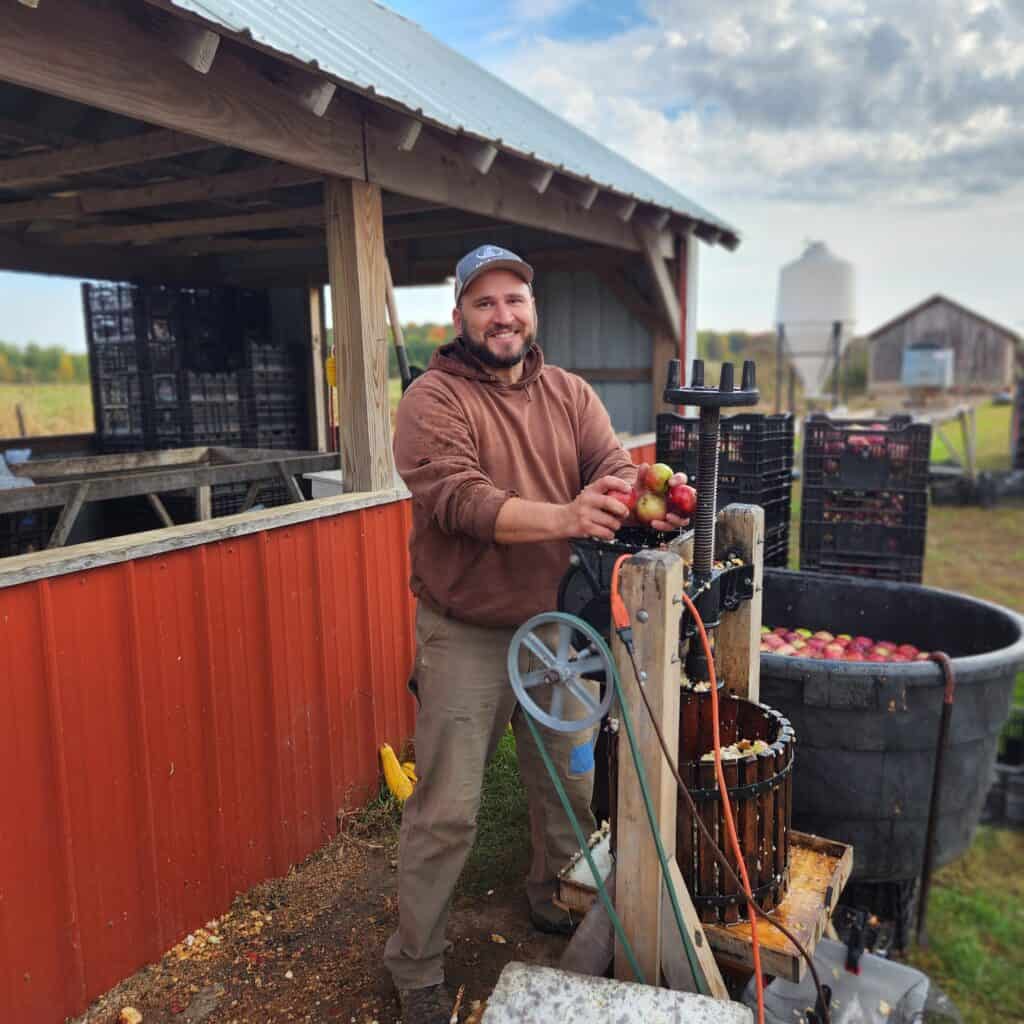
“I taught people in Kenya how to use chainsaws and logging techniques so they can get their lumber to market,” he said. “This work supports children who have lost their parents to AIDS.”
Kuehnhold said he has also worked in southern Mexico, near Oaxaca, on coffee plantations.
“I then purchased that coffee, returned it to Wisconsin for roasting at Liberation Farmers in Almond and served the coffee at the farm,” he said.
Sunday Brunch on the Farm
A more recent feature that’s helping get the word out about Lonely Oak, Kuehnhold said, is its Sunday Brunch on the Farm series, which runs from Mother’s Day through the end of October.
Each week’s dishes, he said, feature ingredients fresh from the farm’s gardens, with a recent Sunday menu offering cheddar bacon quiche; tomato and cream cheese bagel bake; chive and smoked cheddar pancakes with maple bacon topping; and Hungarian sausage soup.
“I talked to the Wood County Health Department about our idea for serving food, and they worked with me to make it happen within some of our existing infrastructure on the farm and coached me through what I needed to do,” he said.
Future plans
Kuehnhold said future plans for the farm are focused on growing the Sunday Brunch series while borrowing inspiration from his love of learning and teaching.
“We average 100-125 meals or plates per Sunday,” he said. “I want to expand that. Our kitchen is the old milk house. It’s really tiny – like a Barbie kitchen. I’d like to build a kitchen where there’s a teaching area, so we can start teaching people how to can and preserve the food that they get through their CSA.”
Kuehnhold said he’d also like to invite other artisans to come and do workshops on making soap, felting wool and other skills that bring people to the farm.
“I’m aiming to start these workshops next summer,” he said.
Kuehnhold said help around the farm includes his mom, who lives next door and makes the quiche crusts for the brunches every week.
“My family is very involved,” he said. “My sister’s family comes and helps. My nephew is helping this fall with the harvest. My aunts and uncles are returning the favor by supporting me now in return for those tens of thousands of hay bales I helped get in the barn.”
Keeping people connected to the land and the families that produce their food, Kuehnhold said, is a driving force behind the local food movement.
“People want to know where their food came from,” he said. “It means so much to have people share their connection to your farm. That’s when you start to realize what you’ve built is way bigger than yourself – that we’re now a part of people’s families – and that’s super meaningful.”
 PetSkull Brewing – a force to be reckoned with in Manitowoc
PetSkull Brewing – a force to be reckoned with in Manitowoc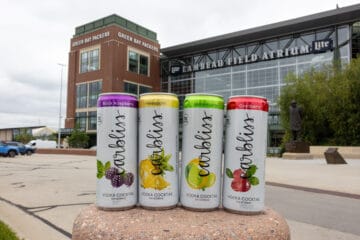 Packers add Carbliss to lineup at Lambeau Field
Packers add Carbliss to lineup at Lambeau Field

